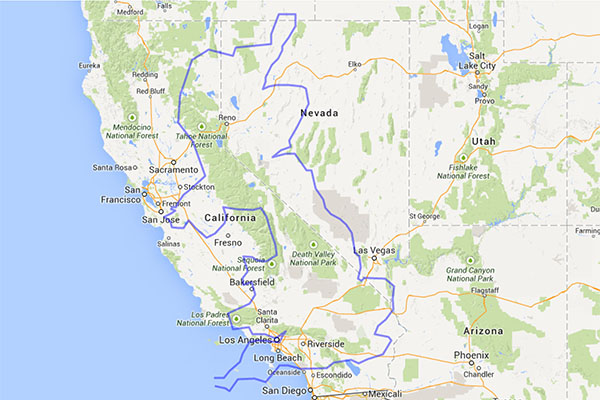Why, do you think, might Bill Gates choose to wash his dishes every night?
An advantage of long-haul flights is time to read. A book I’ve just read felt like exactly the right book to read at this time. The book is ‘Ikigai: The Japanese Secret to a Long and Happy Life’ by Hector Garcia and Francsc Miralles. ‘Ikigai’ is described as ‘the reason we get up in the morning’ and as our raison d’ѐtre.
The book supports a connection between ‘Ikigai’ and longevity and draws on insights from interviews with some of Japan’s elders. There is much in this little book that suggests direction not just in how to live happily in later life but how to live well at any age.
San Francisco
First, something about the state and city that I now find myself in. The guide books describe California as ‘iconic’, as a ‘multicultural melting pot’ and as the USA’s ‘most futuristic social laboratory’. The state motto is ‘Eureka’ meaning ‘I have found it’. The area of California is 155,779 square miles. The map below gives a sense of the scale of California as compared with the UK.

San Francisco, for some of you (Baby Boomers?), may summon up images of flower power, the Beat generation and gay liberation. Others might think first of Silicon Valley and the biotech revolution. The city was transformed from a Spanish colonial mission of around 800 people by the gold rush of 1849, becoming a heaving port city of around 100,000 ‘prospectors, con artists, prostitutes and honest folk.’ The population of San Francisco today is over 800,000, a smallish city when compared with Los Angeles (population of almost 4 million). There is much to see and do and 43 hills to keep you fit. There is also much longevity and bioethics research in progress here and I am privileged to be hosted by Professor Barbara Koenig and colleagues at UCSF these next few weeks (https://www.ucsf.edu/news/2016/05/402631/barbara-koenig-named-head-new-bioethics-program).
Years to Life? Or Life to Years?
The Nuffield Council on Bioethics recently published a briefing note on the theme of ‘The search for a treatment for ageing’. The report summarises some of the findings and ethical aspects of ‘geroscience’ or ‘biogerontology’ wherein researchers explore biological aspects of ageing. This is with a view to finding out the means to increase the years we live and the years we are healthy. The report summarises a range of ‘ageing treatments’ such as drugs, hormones, dietary restriction, enzymes, stem cell therapy, young blood and telomeres. The report points out that ‘the discovery of safe and effective treatments that delay ageing and reduce the risk of ageing-related diseases’ have ethical and social consequences (see http://nuffieldbioethics.org/project/ethics-ageing-research/bioethics-briefing-note-search-treatment-ageing ).
Questions for you…
What are your views? Is ageing a condition to be treated? Is it ethical to research the means to extend life to beyond our current lifespan (approximately 79 for men and 82 for women)? What if the extended period could be healthier with fewer demands of health and social care services? How long would you like to live? And why?
Bill Gates and the Value of ‘Flow’
In the Ikigai book, there is much focus on the value of ‘flow’, that is, of focusing on one thing at a time and of being in the present. In describing ‘microflow’, the enjoyment of ‘mundane tasks’, the authors give the example of Bill Gates (co-founder of Microsoft) who likes to wash the dishes every night. His rationale is that it helps him relax, it clears his mind and he likes to try to do it better every day in an ordered manner.
The book details some Ikigai insights from interviews with Japanese elders as follows: Don’t worry; Cultivate good habits; Nurture your friendships every day; Live an unhurried life; and Be optimistic.
These seem like good practices to aspire to.
So as the Sunday sun sets in San Francisco, I am planning my schedule for my four weeks here and I fear that it will not be long enough. Contrary to the motto of California, I may find only part of what I seek. But perhaps, as in Tuskegee, I will gain insights that I had not expected.
More next week.
